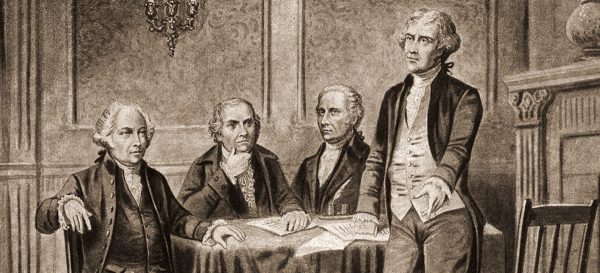America needs many voices to make good on its creed.
The Axiomatic God of Freedom

Free expression is so central to liberty that its restriction by private megapolies is intolerable.
Whether or not Donald Trump wins his suit against the big tech firms that censor him, he is right in principle. No matter the difficulties, paradoxes, and technicalities, these companies’ assaults on free expression have to be stopped by law.
These outfits are not local cake makers who mustn’t be forced to celebrate what they find unholy. They are multi-national outfits with the wealth and power of sovereign states. When Twitter, Facebook, and YouTube act in concert to deny access to the President of the United States, or when a functioning monopoly like Amazon pulls a book for political reasons—as it did with When Harry Became Sally, Ryan T. Anderson’s thoughtful look at transgenderism—they are making it next to impossible for certain ideas and opinions to be widely expressed and known. That is a danger to our right to free speech.
And that right has to be protected by the government because it is given to us by God.
This is not, in other words, a First Amendment issue. The First Amendment protects our free speech from the government. But the government is still responsible for protecting those rights from other threats as well. It says so in the Declaration of Independence.
It was Abraham Lincoln who most fully understood and expressed the fact that, while our Constitution is the law of the land, the “sacred principles” in the Declaration of Independence—“that immortal emblem of Humanity”—give the Constitution its philosophy and its purpose. Governments, the Declaration proclaims, “are instituted among men” to secure the rights endowed in mankind by their Creator.
If this is so, then whether the threat to our God-given rights comes from private entities or from government itself, government is responsible for making those rights secure from that threat.
Recently, on my Daily Wire podcast, I made this argument to Alan Dershowitz, an expert in constitutional law. This was part of his response: “I don’t think I’ve ever said this before, but Abraham Lincoln was wrong… I don’t think you can derive rights from God because there are too many gods, there are too many interpreters of God, there are too many ways in which God has been misused.”
With all respect to Mr. Dershowitz, I side with Mr. Lincoln.
The Declaration holds the truth of God-given rights to be “self-evident.” Clearly, self-evident in this context doesn’t mean obvious. If this truth were obvious, it wouldn’t have taken so many millennia for humans to perceive it. Self-evident here means axiomatic: God-given rights are the unprovable assertion on which all the logic of liberty depends. Every system of thought rests upon such unprovable statements. You can choose to reject the axioms of arithmetic, say, on the basis that they are unprovable, but good luck dividing the check at the end of dinner. Good luck likewise defending your rights without the God of the Declaration.
The Italian philosopher Marcello Pera is an atheist, but he understands God’s essential role as the basis of our freedoms. In his book Why We Should Call Ourselves Christians, Pera writes: “Without faith in the equality, dignity, liberty, and responsibility of all men—that is to say, without a religion of man as the son and image of God—liberalism cannot defend the fundamental and universal rights of human beings or hope that human beings can coexist in a liberal society.”
Mr. Dershowitz is right about one thing, of course. There are many gods and many interpretations of God. But there are also many solutions to the equation two plus two; only one of them, however, is right.
Without 1,776 years of mental conditioning by the Christian religion, it is unlikely Western civilization would have raised up American founders who thought the things they thought. Nonetheless, the axiomatic Creator of the Declaration is not necessarily the God of the Old and New Testaments. The only god we need to believe in—or at least need to stipulate, like Pera, without belief—is a god whose character is such that he would grant inviolable liberty to creatures like ourselves.
Such an axiomatic faith is not too much to ask in return for the dignity of self-government. Yet, for many, even that faith is too great an imposition on their freedom of thought—a freedom they cannot logically justify without it. Many intellectuals especially, moonstruck by their fashionable agnosticism, have convinced themselves their freedom can stand on the pillar of their own assumptions.
Not so. In a broken world where power corrupts, our liberty always walks on water—and that, as the Bible teaches us, is a feat that cannot be performed alone.
The American Mind presents a range of perspectives. Views are writers’ own and do not necessarily represent those of The Claremont Institute.
The American Mind is a publication of the Claremont Institute, a non-profit 501(c)(3) organization, dedicated to restoring the principles of the American Founding to their rightful, preeminent authority in our national life. Interested in supporting our work? Gifts to the Claremont Institute are tax-deductible.
Election 2020 is a choice between the America of the Founding and an America beset with guilt.
A response to Christopher Flannery.



